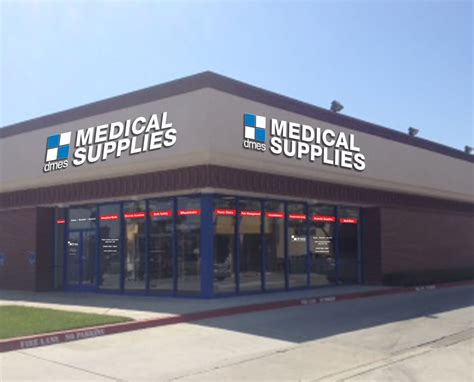How To Start Medical Equipment Supply Business

The healthcare industry is vast and ever-evolving, with a constant demand for medical equipment and supplies. Starting a medical equipment supply business can be a rewarding venture, as it plays a crucial role in supporting healthcare professionals and improving patient care. However, entering this field requires careful planning, industry knowledge, and a strategic approach. This guide aims to provide a comprehensive roadmap for aspiring entrepreneurs looking to embark on this challenging yet rewarding journey.
Understanding the Medical Equipment Market

Before diving into the business aspect, it’s essential to grasp the dynamics of the medical equipment market. This market encompasses a wide range of products, from basic supplies like gloves and gauze to sophisticated devices such as MRI machines and pacemakers. Understanding the diverse needs of healthcare providers, from hospitals and clinics to specialized research facilities, is key to tailoring your supply business accordingly.
Market Research and Target Audience
Conducting thorough market research is the first step towards a successful medical equipment supply business. This involves identifying the specific needs and preferences of your target audience, whether they are large hospitals requiring bulk orders or specialized clinics needing niche equipment. Understanding the competitive landscape, pricing strategies, and the latest industry trends will help you position your business effectively.
| Market Segment | Target Audience | Equipment Focus |
|---|---|---|
| Hospitals | Large-scale healthcare providers | Critical care equipment, surgical instruments, imaging systems |
| Clinics | Smaller healthcare facilities | Diagnostic tools, laboratory equipment, rehabilitation aids |
| Research Facilities | Academic institutions, research labs | Specialized research equipment, lab consumables |

Regulatory and Compliance Considerations
The medical equipment industry is heavily regulated to ensure patient safety and equipment efficacy. Understanding and adhering to these regulations is non-negotiable. This includes obtaining the necessary licenses and certifications, complying with quality standards such as ISO, and ensuring that your equipment meets the specific guidelines set by governing bodies like the FDA.
Building Your Business Foundation

With a solid understanding of the market, it’s time to lay the groundwork for your medical equipment supply business.
Business Planning
A well-structured business plan is the blueprint for your success. It outlines your business goals, strategies, and operational details. Key components include market analysis, financial projections, marketing and sales strategies, and an overview of your unique selling proposition. Consider seeking professional guidance to ensure your business plan is robust and comprehensive.
Legal and Administrative Setup
Registering your business and obtaining the necessary licenses is crucial. This involves selecting an appropriate business structure (e.g., sole proprietorship, partnership, or corporation), registering with local authorities, and acquiring the required business licenses and permits. Additionally, setting up a reliable accounting system and hiring legal counsel to navigate the complex landscape of healthcare regulations can provide invaluable support.
Sourcing and Supply Chain Management
Establishing reliable supply chains is critical for the long-term success of your business. This involves identifying reputable manufacturers and suppliers, negotiating favorable terms, and ensuring a consistent supply of high-quality equipment. Developing strong relationships with your suppliers can lead to better pricing, exclusive deals, and a more efficient supply chain.
Inventory Management
Effective inventory management is essential to avoid stockouts and minimize excess inventory. Implement a robust inventory tracking system to monitor stock levels, lead times, and demand fluctuations. This will help you optimize your stock levels, ensuring you have the right products available when your customers need them.
Marketing and Sales Strategies
Building a strong brand and reaching your target audience are vital aspects of growing your medical equipment supply business.
Brand Development and Marketing
Develop a compelling brand identity that resonates with your target audience. This includes creating a professional logo, designing a user-friendly website, and establishing a consistent brand image across all marketing materials. Utilize digital marketing strategies such as SEO, social media marketing, and email campaigns to reach healthcare professionals and promote your products.
Sales and Customer Engagement
Building strong relationships with your customers is key to long-term success. Offer personalized service, ensuring you understand their specific needs and challenges. Provide timely support, respond promptly to inquiries, and deliver exceptional after-sales service. Consider implementing a loyalty program to reward repeat customers and encourage referrals.
Networking and Industry Connections
Networking within the healthcare industry can open doors to new opportunities. Attend industry events, conferences, and trade shows to connect with potential customers and suppliers. Build relationships with key stakeholders, such as hospital administrators, procurement officers, and medical professionals. These connections can provide valuable insights and open doors to new business opportunities.
Ensuring Quality and Customer Satisfaction
In the medical equipment supply business, quality and customer satisfaction are paramount.
Product Quality and Reliability
Select high-quality medical equipment from reputable manufacturers. Ensure that your products meet industry standards and regulations. Conduct thorough quality checks before supplying equipment to your customers. Providing reliable, high-quality products will build trust and loyalty, leading to long-term business relationships.
Customer Support and Service
Offer exceptional customer support to address any concerns or issues promptly. Provide detailed product information, including specifications, usage guidelines, and troubleshooting tips. Offer training and support to help your customers get the most out of their equipment. A dedicated customer service team can handle inquiries, process orders efficiently, and provide post-sales support.
Feedback and Continuous Improvement
Encourage feedback from your customers to understand their satisfaction levels and identify areas for improvement. Use customer feedback to refine your product offerings, improve service quality, and enhance your overall business operations. Implement a continuous improvement strategy to stay ahead of the competition and meet the evolving needs of your customers.
Conclusion: A Commitment to Excellence

Starting a medical equipment supply business is a challenging yet rewarding endeavor. By understanding the market, building a solid foundation, implementing effective marketing and sales strategies, and prioritizing quality and customer satisfaction, you can establish a successful and reputable business. Remember, a commitment to excellence in every aspect of your business will set you apart and drive long-term success in this competitive industry.
What are the key considerations when selecting medical equipment manufacturers and suppliers?
+When selecting manufacturers and suppliers, prioritize quality, reliability, and reputation. Look for companies with a proven track record in the industry, offering high-quality products that meet regulatory standards. Negotiate favorable terms, including pricing, lead times, and warranty conditions. Building strong relationships with your suppliers can lead to better deals and a more efficient supply chain.
How can I differentiate my medical equipment supply business from competitors?
+To stand out in a competitive market, focus on providing exceptional customer service. Offer personalized solutions, timely support, and expert advice. Develop a strong brand identity that reflects your commitment to quality and customer satisfaction. Stay updated with industry trends and offer innovative solutions to meet the evolving needs of healthcare professionals.
What are the challenges of starting a medical equipment supply business, and how can I overcome them?
+Starting any business comes with challenges, and the medical equipment supply industry is no exception. Common challenges include navigating complex regulations, managing inventory effectively, and competing with established players. To overcome these challenges, seek professional guidance, invest in quality control measures, and build strong relationships with your customers and suppliers. Stay adaptable and proactive, continuously improving your business operations to stay ahead of the competition.



